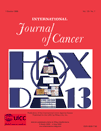The CDH1-160C>A polymorphism is a risk factor for colorectal cancer
Abstract
Part of the inherited susceptibility to colorectal cancer (CRC) is caused by the coinheritance of common low risk variants. E-cadherin (CDH1) has an established role in CRC; somatic inactivation of CDH1 is a common early event, and germline mutations can cause early-onset CRC. The -160C>A promoter variant (rs16260) of CDH1 has been reported to influence CDH1 transcription and thereby represents a strong candidate for a predisposition locus. To examine this proposition, we conducted a two-staged association study based on genotyping a total of 5,679 CRC cases and 5,412 controls for rs16260. CDH1-160C>A genotype was associated with CRC risk (ptrend = 0.001). Compared to common homozygotes, the odds ratios (ORs) of CRC associated with heterozygous and homozygote variant genotype were 0.90 (95% confidence interval [CI]: 0.84–0.97) and 0.81 (95% CI: 0.71–0.93), respectively. In combination with the previously identified 8q21, 8q24, 10p14, 11q, 15q13.3 and 18q21 risk variants, the risk of CRC increases with an increasing numbers of variant alleles for the 7 loci (ORper allele = 1.16; 95% CI: 1.13–1.19; ptrend = 1.68 × 10−34). These data indicate CDH1-160C>A is a risk factor for CRC, and because a high proportion of the European population are carriers of at-risk genotypes, the variant is likely to contribute substantially to the development of CRC. Furthermore, our study underscores the importance of conducting association studies using large sample series to demonstrate polymorphic variants conferring modest relative risks. © 2009 UICC




